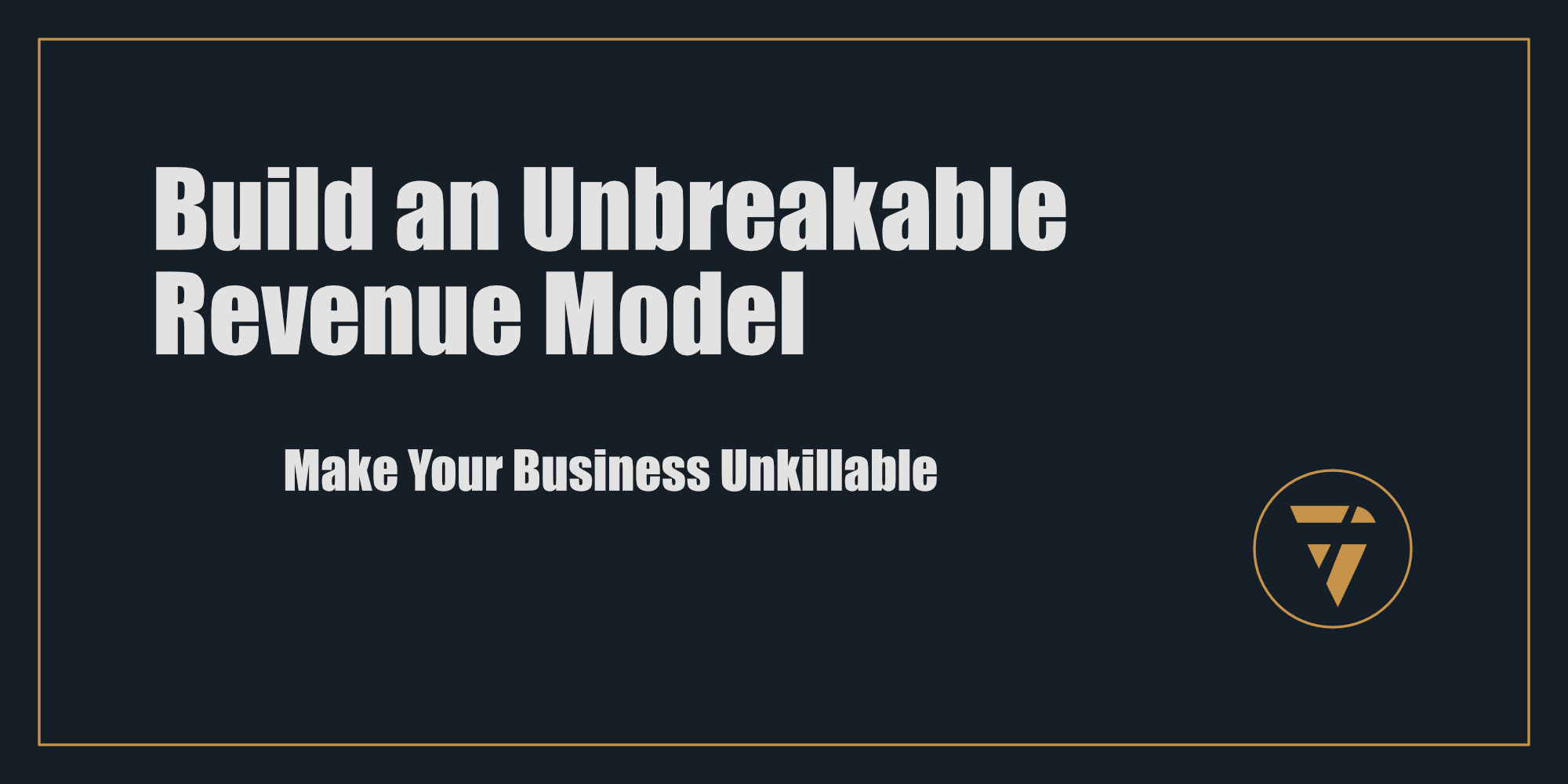Build an Unbreakable Revenue Model

Make Your Business Unkillable
Most businesses operate under a dangerously flawed assumption: that their current stream of revenue will continue indefinitely. They believe that if they keep delivering value, customers will keep buying. This belief is wrong, and it's why so many businesses collapse when economic conditions shift.
Revenue dependency is one of the greatest vulnerabilities a business can have. If your entire business model relies on a single stream of income—one product, one service, one client base—you are exposed to massive financial risk.
Here is what that risk looks like in practice:
- A manufacturing company relying on a few large corporate contracts suddenly loses its biggest client. Their cash flow evaporates overnight, and they have no way to replace the lost revenue quickly enough to recover.
- A retail business thrives during good economic times but struggles when customers cut discretionary spending. Without a way to generate predictable income, their revenue crashes.
- A service provider, dependent on project-based work, has a few months of great income but no recurring revenue. When demand slows, they are left scrambling for new clients just to keep the lights on.
The businesses that survive and thrive in crisis do not rely on one primary revenue stream. They build a system that ensures cash flow, regardless of market conditions.
Why Subscription Models, Prepaid Contracts, and Emergency Pricing Structures Are Critical
Predictable revenue is the single greatest financial asset a business can have. When revenue is consistent, decision-making becomes clearer, risk is lower, and long-term sustainability improves.
Here are three essential strategies to make revenue more predictable.
1. Subscription Models: Build Recurring Revenue
Subscription-based businesses are far more resilient than those that rely on one-time purchases. A steady flow of recurring revenue provides a financial buffer against market downturns.
- Convert transactional customers into ongoing subscribers. Offer maintenance, training, or exclusive memberships that give clients continuous value.
- If you run a service-based business, package offerings into a monthly retainer. Instead of selling individual projects, offer ongoing services with automatic billing.
- E-commerce businesses should create subscription-based product deliveries. Instead of selling one item, offer a monthly replenishment service.
Subscription revenue makes cash flow more predictable, reduces reliance on constantly finding new customers, and increases customer lifetime value.
2. Prepaid Contracts: Secure Future Cash Flow in Advance
Many businesses operate on unpredictable invoicing cycles, waiting for clients to pay long after work has been completed. This delay can destroy cash flow, leaving businesses vulnerable when payments are late or clients disappear.
The solution is to shift to a prepaid contract model.
- Offer discounts for upfront payments. Give clients a financial incentive to pay in advance rather than after work is completed.
- Sell service packages in bulk. Instead of billing monthly for consulting, sell a six-month or one-year contract at a discount.
- Require deposits before starting work. This ensures that every project generates cash before expenses are incurred.
Businesses that operate on prepaid contracts have far greater financial control. They are not at the mercy of late payments or unexpected client cancellations.
3. Emergency Pricing Structures: Adapt to Market Conditions
Rigid pricing models can destroy a business when economic conditions change. If customers suddenly cannot afford your normal pricing, sales drop, and revenue disappears.
Emergency pricing structures allow businesses to maintain cash flow during downturns.
- Create lower-cost, stripped-down versions of your product or service that retain core value but reduce price sensitivity.
- Offer flexible payment plans to make purchases more accessible when budgets are tight.
- Introduce limited-time crisis discounts to keep revenue flowing during economic contractions.
A business that can adjust its pricing structure without sacrificing profitability is far more likely to survive unpredictable market conditions.
Leveraging Barter, Trade Credit, and Non-Monetary Transactions When Cash Dries Up
During economic downturns, cash becomes scarce. Customers hold onto their money longer, and businesses struggle to maintain liquidity. When this happens, businesses that rely solely on cash transactions will struggle to operate. Those that know how to leverage barter, trade credit, and alternative transactions can keep moving forward.
1. Barter: Exchanging Value Without Cash
Barter is one of the oldest forms of commerce and remains highly effective in cash-strapped markets. Instead of relying on money, businesses exchange goods and services of equal value.
- A marketing agency that needs office renovations can trade branding services with a construction company.
- A local restaurant that struggles with cash flow can exchange meals for social media advertising.
- A logistics company needing legal assistance can offer transportation services to a law firm.
Barter allows businesses to preserve cash while still acquiring essential resources.
2. Trade Credit: Extending Payment Terms to Preserve Cash Flow
In tough times, many suppliers and service providers are willing to negotiate extended payment terms rather than lose a customer. Businesses can take advantage of this by requesting trade credit arrangements.
- Instead of paying suppliers immediately, negotiate 60 or 90-day terms to free up working capital.
- Offer clients short-term credit agreements in exchange for long-term commitments.
- Work with vendors to create structured repayment plans rather than making lump-sum payments.
Trade credit helps businesses maintain operations even when cash flow is tight.
3. Non-Monetary Incentives: Retaining Clients Without Cash Offers
When customers hesitate to spend money, businesses can use non-monetary incentives to drive sales and maintain loyalty.
- Offer bonus services, extended warranties, or added features instead of price cuts.
- Provide exclusive access to valuable resources or VIP perks for ongoing customers.
- Implement referral programs that reward customers with additional benefits rather than discounts.
By shifting away from strict cash-based transactions, businesses can create value and maintain customer relationships even when money is tight.
Creating a "Lifeboat Offer" to Survive Industry-Wide Slowdowns
When an entire industry slows down, businesses must act fast to create an offer that generates immediate revenue while maintaining long-term sustainability. A "Lifeboat Offer" is a strategic, high-value, low-risk offer that customers cannot refuse.
Step 1: Identify What Your Market Needs Most in a Downturn
- What problems do customers still need to solve, even when budgets are tight?
- What essential services or products do they absolutely need to keep operating?
Step 2: Create a Simplified, High-Value Version of Your Core Offering
- Strip out unnecessary extras to lower costs while retaining key benefits.
- Make the offer easy to buy with lower upfront costs or flexible payment options.
Step 3: Add a Limited-Time Element to Drive Immediate Action
- Offer the deal only to the first group of customers to create urgency.
- Set a short deadline for purchase to prevent hesitation.
Step 4: Use Strategic Messaging to Position the Offer as a Survival Tool
- Frame the offer as a necessary solution for businesses navigating tough times.
- Communicate the long-term savings and advantages of taking action now.
A well-executed Lifeboat Offer can generate immediate cash flow, keep customers engaged, and ensure survival when the market is at its worst.
The Businesses That Survive Will Be the Ones That Adapt
Rigid business models collapse under pressure. The businesses that build multiple revenue streams, secure cash flow in advance, and leverage alternative transactions will be the ones that outlast market downturns.
The question is not whether your industry will face a slowdown. The question is whether your business will be ready when it does.
This is what I’m working on. Tell me what you think, I enjoy the conversation! Subscribe and follow the work in real time.
Thanks!
B

Your clients will disappear overnight. If your business has one revenue stream, you are one crisis away from collapse.
Recurring revenue, prepaid contracts, and trade credit keep you alive when cash dries up. Build now, or scramble later.
Make your business unkillable.
PS -






